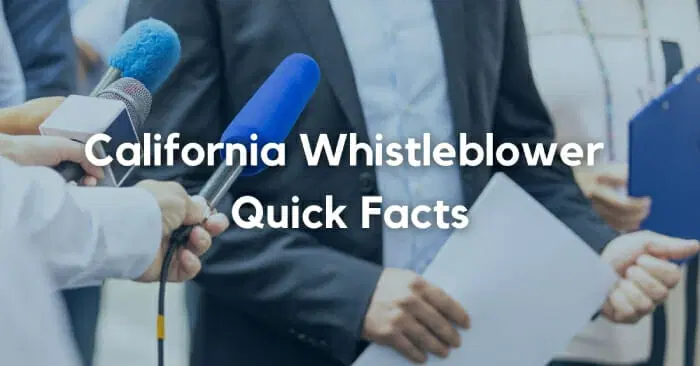
California Whistleblower Protection Act Quick Facts
Legally reviewed by: Jessica Anvar Stotz, JD, MBA
The Whistleblower Protection Act in California is legislation that provides legal safeguards and protections to individuals who disclose information about illegal activities, waste, fraud, or abuse within government agencies or private sector organizations, ensuring their rights and guarding against retaliation.
California Labor Code section 1102.5 and the Sarbanes-Oxley Act of 2002 define whistleblower laws in California.
Overview of California Labor Code Section 1102.5
California Labor Code Section 1102.5, a crucial whistleblower protection law, prohibits employers and their representatives from hindering employees in disclosing information to government agencies, authorities, or colleagues about potential violations of state, federal, or local laws, rules, or regulations.
This includes situations where such disclosures are not part of an employee’s job duties. Additionally, the law forbids employers from retaliating against employees for making such disclosures or for the belief that an employee might disclose information.
The 2014 amendment extended protection to employees reporting internally or externally to government bodies. The law applies to both public and private employers. Its core provisions encompass:
- Section (a): Employers can’t impede employees from disclosing information to government, supervisors, or peers. Employees must reasonably believe the information reveals violations of laws, regardless of job duties.
- Section (b): Protects employees disclosing information to law enforcement, supervisors, or peers about violations. Like (a), the disclosure need not be within job duties.
- Section (c): Guards employees refusing to participate in unlawful activities.
- Section (d): Prohibits retaliation for prior protected actions in former employments.
- Section (e): Covers government employees’ reports under (a) and (b).
- Section (f): Imposes a $10,000 penalty for each violation.
- Section (h): Prevents retaliation against family members of those engaging in protected activity.
Employees establish a retaliation claim if they prove their protected activity contributed to retaliation. Employers can only avoid liability by demonstrating, via clear and convincing evidence, that legitimate, independent reasons prompted the adverse action.
Overview of Sarbanes-Oxley Act of 2002
The Sarbanes-Oxley Act of 2002, also known as SOX, is a pivotal federal law enacted to prevent retaliation against employees who provide information about conduct that they reasonably believe constitutes a violation of federal law relating to fraud against shareholders. To prevail under SOX, a whistleblower must prove each of the following with evidence:
- They engaged in protected activity
- The employer knew that they engaged in the protected activity
- They suffered an unfavorable personnel action
- The protected activity was a contributing factor in the unfavorable action.
- The law aims to safeguard individuals who bravely expose wrongdoing, even if their belief is “reasonable but mistaken.” Notably, disclosures need not definitively relate to specific fraud or securities violations, only that the employee “reasonably believed” their employer violated federal law.
California Whistleblower Rights
California Whistleblower Rights encompass various statutes designed to safeguard California whistleblowers reporting misconduct, fraud, or violations of law. Here are the key whistleblower rights in California:
- California False Claims Act (Government Code Section 12650 et seq.): Also known as California’s Qui Tam statute, this act protects employees who expose billing fraud and other fraudulent activities towards the state or governmental bodies. It aims to prevent contractors from submitting false invoices for payment.
- California Whistleblower Protection Act (Government Code Section 8547-8547.12): This act emphasizes that state employees should be free to report waste, fraud, abuse of authority, violations of law, or threats to public health without fearing retribution. It covers improper governmental activities and prohibits retaliation for protected conduct.
- Retaliation Protection by California State Auditor: The California State Auditor is authorized to receive and investigate complaints about improper governmental activities. The Whistleblower Protection Act prevents retaliation against state employees who file complaints and provides avenues for reporting retaliation.
- Protection under California Supreme Court Ruling: The California Supreme Court has ruled that workers who report violations of the law to their supervisors are eligible for whistleblower protections, even if the employer was already aware of the violations. This underscores the importance of encouraging disclosure to promote compliance with employment laws.
- Specific Employee Conduct Protection: Whistleblower protections extend to employees who disclose information involving violations of state or federal law, as well as those who refuse to participate in activities that would breach such laws. These protections apply to both public and private employees.
- University and College Employee Protections: Employees of the University of California and California State University are provided with channels to report retaliation. Designated officials or departments exist to address retaliation concerns.
These provisions collectively aim to create an environment where employees can report misconduct without fear of adverse actions. The laws not only protect whistleblowers but also encourage a culture of compliance and transparency within organizations.
What Kind of Compensation Can Whistleblowers Recover?
Whistleblowers can potentially recover compensation in the form of monetary rewards for their efforts in exposing fraud, misconduct, and violations of the law. The compensation structure varies based on the specific whistleblower reward laws and programs in place:
- False Claims Act and Qui Tam Lawsuits: Whistleblowers (referred to as “relators” in qui tam cases) may receive a percentage of the money recovered by the government if their information leads to a successful enforcement action. The reward typically ranges between 15% and 30% of the recovered amount. The specific percentage can depend on factors such as whether the government joins the case.
- SEC Whistleblower Program: The U.S. Securities and Exchange Commission (SEC) offers monetary awards to eligible individuals who provide original information that leads to successful enforcement actions resulting in sanctions exceeding $1,000,000. The reward range is between 10% and 30% of the money collected.
- IRS Whistleblower Reward Program: The Internal Revenue Service (IRS) whistleblower program provides rewards for exposing tax underpayments. Whistleblowers can receive 15% to 30% of the unpaid taxes, fines, and interest collected, with higher rewards for larger cases.
- Other Whistleblower Reward Laws: Various other laws, such as state False Claims Acts, may also offer financial awards to whistleblowers who report fraud involving government funds.
- Retaliation Damages: In addition to monetary rewards for reporting violations, whistleblowers may also be entitled to other forms of compensation, such as reinstatement to their job, recovery of lost wages, benefits, and compensatory damages if they face retaliation for their actions.
Whistleblower rewards serve as a means to encourage individuals to come forward with valuable information about fraudulent activities while protecting them from retaliation. The specific compensation can vary depending on the laws and regulations governing each case.
Importance of Encouraging Whistleblowing & Whistleblower Protection
Encouraging whistleblowing and providing robust whistleblower protection mechanisms are essential for fostering transparency, accountability, and integrity across various sectors of society.
Whistleblowers play a critical role in exposing wrongdoing, corruption, safety hazards, and unethical behavior that might otherwise go unnoticed. By providing a platform for individuals to come forward with information, organizations and governments can identify and address issues that could have far-reaching societal implications.
Whistleblower protection ensures that individuals who courageously step forward are shielded from retaliation, enabling them to speak up without fear of reprisal. Effective protection mechanisms not only safeguard whistleblowers’ rights but also promote a culture of accountability, where unethical conduct is discouraged, and ethical behavior is rewarded.
When whistleblowers are confident that their actions will be met with support rather than hostility, they are more likely to expose vital information that can lead to corrective actions and prevent future harm.
Moreover, whistleblower disclosures can save taxpayer funds by uncovering fraud, waste, and abuse in government programs. They contribute to preventing financial and reputational losses for private corporations, maintaining public trust, and upholding ethical standards.

Example Whistleblowing Scenarios
Scenario #1: Environmental Hazard Exposed
A diligent employee working for a California construction company discovers that the company has been illegally disposing of hazardous waste materials in a nearby river. Concerned about the environmental impact and potential harm to local communities, the employee becomes a whistleblower.
They gather evidence of the unlawful practices and report the findings to the California Environmental Protection Agency (CalEPA). The whistleblower’s courageous actions lead to an investigation, resulting in the construction company being held accountable for its actions, significant fines being imposed, and the restoration of the affected ecosystem. The whistleblower’s actions help protect the environment and public health.
Scenario #2: Health and Safety Violations in Healthcare
In a prominent California hospital, a nurse becomes aware of recurring health and safety violations that are compromising patient care. Despite raising concerns internally, the hospital administration fails to address the issues. Frustrated by the lack of action, the nurse decides to blow the whistle.
They provide evidence of unsanitary conditions, inadequate staffing, and improper medication management to the California Department of Public Health. As a result, an investigation is launched, revealing systemic problems. The hospital is required to implement corrective measures to ensure patient safety, and the nurse’s courage in coming forward leads to improved healthcare standards and better patient outcomes.
Examples of Successful Whistleblower Cases in California
- In 2015, a major pharmaceutical pay-for-play health insurance fraud case led to a $23.2 million settlement with Warner Chilcott, accused of defrauding California insurers. Former employees alleged the company used illegal inducements, like kickbacks and falsified forms, to boost prescriptions. The settlement addressed violations of the California Insurance Code False Claims Act. The case revealed a pay-for-play scheme and resulted in enhanced fraud prevention efforts. A separate federal lawsuit led to Warner Chilcott’s $125 million settlement for healthcare fraud and false claims.
- Verizon and AT&T settled whistleblower cases for $116 million in California and $11 million in Nevada, in late 2019. Allegations centered on grossly overcharging government entities for wireless services over a decade, violating cost-saving requirements in major contracts. Whistleblower OnTheGo Wireless, LLC, represented by Susman Godfrey and co-counsel Constantine Cannon, sued under California and Nevada False Claims Acts. Sprint and T-Mobile previously settled for $11 million. The total settlement sum across all telecom providers was $138 million. The largest users affected included the State of California, the California State University and University of California systems, and various city and county governments.
- In 2022, Los Angeles physician Minas Kochumian M.D. was ordered to pay $9.5 million to resolve allegations of submitting false claims to both Medicare and Medi-Cal. He was accused of billing for procedures and tests that were never performed, including fraudulent injections and treatments. The settlement includes restitution for criminal health care fraud charges and resolves allegations under the False Claims Act. Whistleblowers Elize Oganesyan and Damon Davies will receive over $1.75 million for their share in the recovery. The investigation was conducted by both the U.S. Department of Health and Human Services Office of Inspector General.
Reporting and Investigation Procedures
Reporting and investigation procedures are critical components of addressing misconduct and maintaining ethical standards within organizations. These protocols provide a systematic approach for employees to report concerns while ensuring thorough and unbiased investigations for a fair resolution.
How to Report Wrongdoing as a Whistleblower
Consider following these steps to report wrongdoing as a whistleblower:
- Gather Evidence: Collect all relevant information, documents, and records that support your claims.
- Internal Reporting: Notify your supervisor, manager, or designated internal contact about the issue, following your organization’s reporting procedures.
- Government Agencies: If internal reporting doesn’t yield results, consider reporting to appropriate government agencies related to the violation, such as the DFEH, DLSE, Cal/OSHA, or other relevant bodies.
- Protection Measures: Understand your rights and protections under whistleblower laws in California, which safeguard you from retaliation.
- Legal Counsel: If necessary, consult an employment attorney experienced in California whistleblower law who can guide you through the process and protect your interests.
- Anonymous Reporting: Some agencies and organizations offer anonymous reporting channels to protect your identity.
- Document Everything: Maintain a record of all communications, actions taken, and responses received during the process.
Obligations and Responsibilities of Employers
Employers in California have obligations and responsibilities towards whistleblowers, which include:
- Non-Retaliation: Employers must not retaliate against employees who report violations, ensuring a safe environment for disclosures.
- Policies and Procedures: Employers should establish clear policies and procedures for reporting misconduct, ensuring employees know how to voice concerns.
- Investigation: Promptly and thoroughly investigate whistleblower complaints, maintaining confidentiality when necessary.
- Preventive Measures: Implement measures to prevent wrongdoing and protect whistleblowers from retaliation, fostering a culture of accountability.
- Documentation: Maintain accurate records of complaints, investigations, and actions taken to address reported issues.
- Compliance: Adhere to state and federal whistleblower protection laws, providing necessary training to employees about their rights and company policies.
Whistleblower Investigations and Enforcement Agencies in California
Here is a bulleted list of whistleblower investigation and enforcement agencies in California:
- California Department of Fair Employment and Housing (DFEH)
- California Division of Labor Standards Enforcement (DLSE)
- California Occupational Safety and Health Administration (Cal/OSHA)
- California State Auditor’s Whistleblower Hotline
- California Attorney General’s Whistleblower Hotline
- California Department of Industrial Relations (DIR)
- California State Personnel Board (CSPB)
Frequently Asked Questions
Do whistleblowers get paid in California?
Yes, in California, whistleblowers can receive financial rewards under certain conditions. The California Whistleblower Protection Act and other laws offer protection and potential compensation to employees who report illegal activities or violations of regulations by their employers. Rewards are typically a percentage of recovered funds in cases of fraud against the government.
What are the damages for a whistleblower in California?
Whistleblowers in California can seek damages such as reinstatement, back pay, and compensation for other losses resulting from retaliation. The damages may vary depending on the specific circumstances of the case and the extent of harm suffered by the whistleblower due to their protected disclosures.
Can you be fired for whistleblowing in California?
No, California law prohibits employers from firing, retaliating, or discriminating against employees for whistleblowing. The California Whistleblower Protection Act and other relevant laws safeguard employees who report illegal activities, violations, or health/safety concerns. If retaliation occurs, employees have legal recourse to seek damages and reinstatement.
What is the whistleblower retaliation law in California?
The whistleblower retaliation law in California is primarily governed by the California Whistleblower Protection Act (WPA) and other related statutes. It prohibits employers from retaliating against employees who report violations of laws or regulations, participate in legal proceedings, or refuse to engage in unlawful activities.
Get in Touch with a Lawyer
If you suspect you or someone you know might have a whistleblower case against an employer, don’t hesitate to take action. Contact LawLinq, a legal referral service that connects individuals across California with experienced attorneys.
You can safeguard your rights and get the guidance you need to handle your whistleblower case effectively through LawLinq- at no cost from us. Contact our team today at (855) 997-2558 or through our website to get started.


